Text
A...A...ACHOO!🤧🤒
Takeaway: Illness is a social construct.

Yesterday, I interviewed one of my closest friends to determine how she gets healthy and stays healthy. Prior to the interview, I suspected that her responses would be akin to mine due to our glaring similarities, but I was proved incorrect. Even with our similarities, I failed to take into account our different household makeup. I come from a purely African family that does their best to make it obvious; she comes from a mixed family consisting of a Hispanic mom and a southern, traditional black dad. Her mom had always been a free spirit, so I should have anticipated some of her responses. The interview is as follows:
Whom do you call? I usually call my mom, but my mom can’t keep her mouth shut so eventually my grandma finds out too. I don’t really have to say anything though when I am sick because she (her mom) can usually figure it out. She’ll notice that I’m in bed more than usual, so she’ll immediately suspect that something’s up.
What strategies do you use to get well? I typically just rest. I’ll lay down somewhere with my knitted blanket and try to sleep the sick away. But if that doesn’t help much, I’ll make some tea and just let the warmth permeate my body.
What strategies do you use to get well? I use heating pads and ice packs mainly. If it’s something more serious, like a migraine maybe, I’ll just have my mom massage my temples with some peppermint oil. But sometimes, I’ll use steam too. Like I’ll hop in a shower and use lavender oil to help.
What strategies do you use to relieve the pain? I basically just do the same thing. If I have like a stomach virus, I just lay down and eat minimally. So I’ll chew on some crackers and drink some tea until I start feeling better. Sometimes I’ll feel better in like a couple hours, but there was this one time I felt like sh*t for like two days, even with all that.
Are your healing strategies specific to your family, ethnic group, religious affiliation or local or national context? I guess family and ethnic group. My family tend to go more toward more natural remedies because we barely use actual medicine. Like the only time we’ll use medicine is if something is seriously wrong or someone is in a tremendous amount of pain. But other than that, we just stick to natural ways of treating ourselves.
Are your healing strategies guided by moral, economic, religious, or legal mandates or constraints? I think moral, if I understand what the question is asking. Like I said before, my family pretty much thinks medicine is useless. There are so many natural remedies out there that no one really talks about or acknowledges. Like why not use what’s of the Earth? It’s all there for a reason... I don’t know... medicine is just a no-go with us because why risk possibly building a tolerance to some pill and getting addicted?
How do you figure out what made you sick so you don’t get sick again? Oh, I use online sources for sure. Who doesn’t? WebMD, Mayo Clinic, I use it all. But I don’t really get sick, and if I do, it’s usually the same thing: a stomach virus. I’ve had it often enough to know that you shouldn’t drink orange juice when your tummy’s feeling funny. Don’t ask how I know, but trust me, I know.
When you are sick, how do you keep others from being infected? I usually just stay in my room, to be honest. If I do end up going out, I try to keep my distance and avoid everyone, especially my grandma. I make sure not to really touch anything too, just so nothing lingers around. Once I do start feeling better, I get some Lysol wipes and just clean like a freakin’ mad man. Then I’ll wash my sheets too because I don’t want to sleep in the same sheets I was hacking all over.
How do you feel about getting sick? I mean, I don’t really get sick like that, but I guess when I do, it’s just my body telling me to slow down and take a seat. I get light-headed and queasy often—you know this. So it’s really just my body saying, “hey girl, we can’t do this no mo’. You better sit yo a** down.”
Is there a social cause of your illness or disease? Yeah, there probably is. I do get stomach bugs a lot, so that’s likely because someone in this family don’t know how to cook sh*t—out here giving salmonella like it’s candy. But seriously though, it probably is due to food preparation. We do go out and get takeout often, so maybe one of those restaurants is foul and we just never realized.

It was pretty eye-opening discovering my friend’s stance on medicine. I always knew she opted for more natural substances when dealing with sickness, but I was unaware that she was so against biomedicinal healing practices. I think her upbringing played a significant role in how she views sickness and goes about treating it. Her mom is not the biggest fan of medicine, so I suspect that she passed down her way of thinking to her daughter (my friend). She would rather drink some herbal tea and rub essential oils on her temples than pop an Advil. I do understand why she would choose natural remedies over man-made medicine. The former has not been tampered with, unlike the latter. I am sure it is more reassuring to ingest something that was made by the Earth rather than in a lab. This interview made me more partial to trying natural treatments before I immediately opt for some Aleve or Tylenol. It seems to be effective for her, so I just might give it a go.
4 notes
·
View notes
Text
👨🏿✈️ Coming to Am3rica 🤴🏾
Even though I could not interview myself, I decided to interview my mom—who I will name Beverly—and have her detail her own rendition of the popular movie series, “Coming to America.”
Why Did She Come to America?
Beverly came to America for the same reason every parent does: a better life. Even though she and her husband had well-paying jobs in Nigeria—her home country—she was willing to sacrifice it all to provide her children with better opportunities. It was always her husband’s dream to emigrate out of Nigeria. Plus, she knew that America was highly developed and would be able to provide her kids with all the basic amenities needed to survive and thrive. Due to those reasons—and the constant nagging she received from her husband—she gave in and agreed to immigrate to America.

How Did the Journey Begin?
Before Beverly and her family embarked on a journey to America, she had to complete the necessary actions required to even step foot on a plane headed to the States. Beforehand, her husband participated in the Green Card Lottery. It would allow up to 55,000 foreign nationals to participate in a random drawing for the potential of getting an immigrant visa (green card). To the grace of God—her words—he won! After receiving the news, they celebrated with friends and family. Even though they were all excited about winning the lottery, Beverly assumed deep down that they were just looking forward to the remittances.
What Were Some Major Barriers?
Even though her husband won the Green Card Lottery, that did not automatically mean they would receive green cards. Beverly stated that they still needed funds to check off all the requirements to obtain the visas. She and her family had to get their fingerprints done, pass several medical tests to ensure their health, and pass an interview at the American Embassy. All those items were paid for out-of-pocket, with the embassy interview adding up to 775 USD per person. It was a big gamble for Beverly and her husband because if they failed the interview, all the money they put into preparation would go down the drain. Thankfully, they passed, but mentally, it was difficult for Beverly to come to terms with emigrating out of Nigeria. It was stressful because she could not imagine leaving everything behind. She knew she would have to go back to square one because her bachelor’s degree from Nigeria would not be accepted in America. She was not looking forward to competing with high schoolers or dedicating years to go back to school, but she was willing to do whatever it took to ensure her daughters received better life chances.

What Was One Major Bridge?
Even though Beverly was hesitant about leaving everything behind to immigrate to America, there was one thing that calmed her nerves slightly: her elder cousin. She lived in Hyattsville, Maryland, and offered to accommodate Beverly and her family if they went through with the immigration process. Beverly had always been close with her cousin, calling her “big mommy” when she was younger, so once Beverly and her family arrived in Maryland, she quickly acclimated to their home.
What Hardships Did She Face in America?
“Toto, I have a feeling we’re not in Kansas anymore.” According to Beverly, a lot of things were different in America compared to Nigeria. The language barrier, for starters, was the biggest difference. Beverly was no longer surrounded by people who could understand her native tongue, Yoruba. People mainly spoke English and would jeer at her accent whenever she attempted to speak the same language. She felt isolated because she had no real sense of belonging. Attempting to get a job was a challenge in America as well. Back in Nigeria, her education and work experience would make her a sure-fire hire. America, on the other hand, not so much. Employers did not accept her foreign degrees, and her thick accent did nothing to improve her job prospects. Even the school system was different. Due to the fact that her eldest daughter was born after September, she was pushed back a grade—even though her test performance demanded otherwise. Beverly had to try to get used to the difference in people, food, and weather—she cannot stand the cold.
Does She Think She Made the Right Decision?
“Definitely!” The decision to come to America was not an easy one. Leaving behind her family, her home, and her roots was nothing short of a miracle, according to her husband. She had no idea how good or bad things would be in America, so she carried that hesitance all the way to the boarding station. It was not until she had been in America for some months did she realize that a whole lot of good came from her decision.

1 note
·
View note
Text
🍫“Break Me Off a Piece of That Kit-Kat Bar”🍫

The Birth of Kandy the Kit-Kat Bar
On November 14th, Kandy the Kit-Kat was born into existence. With no mother or father to call her own, she poured her energy into others, reminding them of the importance of taking breaks. Recently, she began to develop an interest in her past. Her manufacturers told her not to dig into her history, but her curiosity got the best of her. What she discovered was mind-boggling at best.
What is Kandy Made Of?
Reading through the super-secret files she found on the “big man’s” desk, she discovered she was made of the following ingredients: sugar, wheat flour, skim milk, cocoa butter, chocolate, vegetable oil—palm kernel oil, palm oil—milk fat, lactose, lecithin, PGPR—polyglycerol polyricinoleate—vanillin, salt, yeast, and baking soda. But then her eyes noticed something else, something written in tiny words near the end of the files: “Filling includes re-worked Kit-Kats.” Shocked, she quickly dropped the files, standing straight as a board as she absorbed what she saw. She realized that she was not simply born into existence; instead, she was created from the bits and pieces of other Kit-Kats before her. After taking a moment to find her composure, she resumed her research. Now she wanted to determine the source of those ingredients.

Where Are Those Ingredients From?
Closing her tab on Chance the Rapper, Kandy began her search on the ingredients used to make her. There were some elements she had no particular interest in, so she chose to ignore them. Instead, she directed her research efforts on the ingredient that most constituted Kit-Kat bars: chocolate. Digging deep, she discovered that Côte d'Ivoire and Ghana produced 59% of the world’s chocolate. Though that surprised her, information concerning the hard manual work and labor required to harvest cocoa pods took the cake. Her mouth was agape as she read that everything was done by hand, from the harvesting and breaking of the pods with machetes to the fermentation, drying, and cleaning processes. When finished, the exposed cocoa seeds are packed into sacks and sold to intermediaries, then exporters. Kandy stopped reading from that point on. It shocked her that even though cocoa farmers—including child laborers—work up to 14 hours a day, they only receive 6% of the final value of a chocolate bar.

How Are Prices Set?
Kandy began to wonder how cocoa farmers received so little for the large amounts of work they accomplished day by day. She discovered that supply and demand determined the price of chocolate: a rise in demand for chocolate coupled with any disruptions/shortages could significantly increase its price. Large international corporations involved in the chocolate business—Mars Wrigley, Ferrero, Mondelez International, The Hershey Company, and Nestle—go to great lengths to hedge or limit risks in commodity price fluctuations. In the United States, Kandy learned that the Federal Food Administration (FDA) manages the sale of chocolate and has various regulations in place as to what is chocolate versus what is not.
How Are Kit-Kats Marketed?
Kandy was always aware that she was popular in the United States, especially with the young lady narrating her thoughts and actions. The thing is, she had no idea how that came to be. On to Google, she went. There, she realized that she was marketed to be a “break” treat. Advertisements would encourage people to “have a break, have a Kit-Kat.” Even their various socials were chock-full with pictures, posts, and hashtags about the importance of taking a break with a Kit-Kat handy. They made use of celebrity endorsements as well, namely Chance the (w)Rapper—Kandy’s one true love.

Where Was Kandy Purchased?
King-sized Kandy was purchased through the app “Gopuff” for $2.59. Before she was purchased, she laid at rest at a nearby convenience store. Due to the possibility of tacking an additional percentage to the original price, the storeowner could make profit margins between 55 to 75% for each pound of chocolate sold. Curious about the hidden costs likely excluded from the price of a Kit-Kat bar, Kandy, once again, took to Google. There, she discovered that chocolate was a treat that came at a greater cost than most realized. Child labor is frequently employed to account for the growing demand for chocolate around the world—some are as young as five. Those children are required to use machetes and lift 100-pound bags the size of full-grown men. Most are the victims of human trafficking, selling up to $34 and promptly forced into working for cocoa farmers. Kandy also discovered the unspoken environmental impact hidden from the cost of a chocolate bar. Cocoa farmers typically clear forests to plant new cocoa trees rather than reuse the same land. That has caused the Côte d'Ivoire—the world's leading cocoa producer—to undergo mass deforestation, losing 80% of its rainforests in the past 50 years. Cocoa farmers are planting cocoa trees in the country’s national parks, cutting down protected areas, and converting them into farms.
Will You Continue Purchasing Kit-Kats?
Kandy glanced at the narrator, wondering if the young anthropologist could still indulge in her weekly chocolates after reading terrible things about chocolate production. The narrator solemnly nodded, “Yes.” “I’m a self-diagnosed chocoholic, so even though I do not support the conditions cocoa workers are subjected to, their hard work is certainly appreciated.” Shame on the narrator.

1 note
·
View note
Text
The Three Giants of Social Class... no, not Musk, Bezos, and Gates!
Karl Marx
https://www.thebalance.com/how-outsourcing-jobs-affects-the-u-s-economy-3306279

Karl Marx was one of the first people to acknowledge the shifting classes of people. What once was an egalitarian society quickly transformed into one of hierarchies and social distinction. Marx determined that there were two classes of people: the bourgeoisie and the proletariat. Since the bourgeoisie owned the means of production, they preyed on desperate proletariats struggling to make ends meet. Fast-forward a few hundred years, and the bourgeoisie continue to take advantage of the proletariats; only now, they have the freedom to do so outside their territories. The above article speaks of outsourcing, a method heavily utilized by those of elite status. They take advantage of those with lower standards of living, encouraging them to toil harder, faster, and longer for wages that would be unacceptable in the States. By doing so, they lower the cost of production dramatically, effectively increasing the difference between production costs and the sales price and putting extra dollars in their pockets.
Max Weber
https://www.forbes.com/sites/camilomaldonado/2019/10/10/trump-tax-cuts-helped-billionaires-pay-less-taxes-than-the-working-class-in-2018/?sh=421a6e3b3128
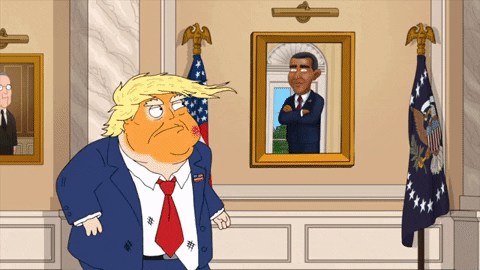
Max Weber asserted that elite control was impossible without the support of the state. He claimed that the state perpetuated class stratification through the exercise of its power; sadly, he wasn’t wrong. In the article, it states that in 2018, our previous president, Donald Trump, provided the top 0.01% with generous tax cuts. Tax cuts so generous that billionaires paid less in taxes than us working-class Americans. How dare something to that extent happen? The thought of mega-billionaires paying less than Americans who constantly bust their tails to support their families is horrifying. Those billionaires already have it made. They have enough to last them tens, if not hundreds of generations. They have no need to think of life chances because they have surpassed that mark and will continue to do so time and time again. But to us working-class Americans, us college students suffering from loan debt, us older Americans drowning in medical loans, that is a slap to the face. In what world does it make sense for those with the most to contribute the least? Weber spoke of life chances and the effects of prestige on those chances, but how do ordinary folks stand a chance when they are held down while the rich are lifted higher and higher?
Pierre Bourdieu
https://www.brookings.edu/articles/unequal-opportunity-race-and-education/

Pierre Bourdieu recognized the reality of cultural capital and its effects on all facets of our lives, particularly educational institutions. From an early age, children are placed into separate tracks based on standardized test performances and teacher evaluations, as well as access to resources specifically made to advance certain groups over others. Wealthy parents fund wealthy schools that spare not one cent when providing key educational resources such as skilled teachers, quality curriculum, and up-to-date technologies. Those advantages make one thing clear: students consistently receive starkly different educational opportunities based on their social class. Without adequate funding or investment in schools that hold economically disadvantaged students, social reproduction from both spectrums will endure.
1 note
·
View note
Text
FIELDWORK: A Stranger Within my Home
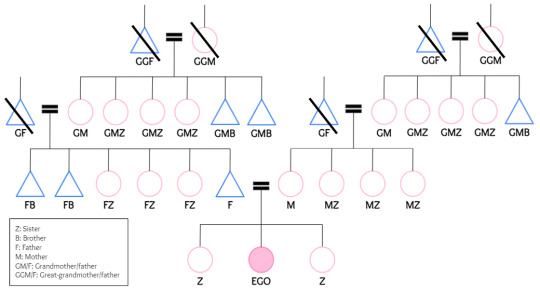
Why A Stranger?
As a child, I'm sure I spent a decent amount of time around my relatives. I have the pictures to prove it—what's missing are the memories. I remember so little about my extended family that it's almost embarrassing. If anyone ever asked me to state either of my grandmothers' first names, I would stare at them with a blank face. I don't know their birth dates—not even the month. I've never seen/heard about my cousins in Nigeria, and I can barely remember the faces of my cousins in Hyattsville. I feel like a stranger in my home; it's sad and quite depressing at times. I wouldn't be able to blame anyone if they ever yelled, "stranger danger," as I walked by because, quite frankly, they aren't wrong.
What Memories Lie in Your Tree?
My family tree tells the story of chieftains, government officials, housewives, immigrants, and strangers—that's me! I know general details about prolific members of my extended family, such as my grandparents, but I know nothing close to their full stories. I remember visiting my paternal grandmother frequently when my family still lived in Nigeria. My mom loved to go on and on about how often I'd cry when she wasn't around. She was the only one who could hold me without my resistance. I was definitely a crier, but she knew how to make me feel at peace. Understanding that I used to have such a close bond with her makes it all the more embarrassing that her first name eludes my mind. Fast-forward 4 or so years, once we immigrated to America, we stayed with my first cousins (not included in the tree). I grew a close connection with the youngest of her family; her name was Madinat. I looked up to her as though she were my elder sister. We would paint our nails together, talk about boys, and she'd take me trick-or-treating. But once my family moved away, that relationship was left behind—I guess there was no space for it in the trunk. Looking back, I'm thankful that I still have memory of those that were once an integral part of my life. It warms my heart knowing not all is forgotten. I would love to know more about the rest of my extended family and finally learn what my grandmothers' names are because, truthfully, being a stranger sucks a**.

0 notes
Text
FIELDWORK: Do Commercials Still Perpetuate Gender Roles?
As a child, I watched endless hours of Yo Gabba Gabba!, Arthur, 6teen, Rugrats, Winx Club, and The Powerpuff Girls. Those shows were the highlight of my childhood. Those provided my young eyes with the epitome of kid T.V. To this day, I still enjoy my childhood favorites—I have no shame in admitting that. They shaped my worldview and introduced me to all types of people from various backgrounds, especially Arthur. The advertisements that appeared in between shaped my worldview as well; sadly, some reinforced gender stereotypes. They taught my impressionable mind that the human race hosts two distinct genders: male and female. Either conform or be marginalized.
Diversity of Commercials
Back then, advertisements were severely gendered. The girls would play with dolls while the boys would fight with their action figures. The difference between those two? One is marketed towards females while the latter, males. *insert rolling eye emoji* Nowadays, more advertisements are leaning towards gender-neutral techniques, ditching the typical stereotypes displayed on television. Out of the 12 advertisements I watched on Nick Jr., five targeted girls, one focused on boys, and the remaining five were non-gendered. It's not perfect, but it is a step in the right direction.

Commercials Aimed at Girls
To attract young female viewers, the majority of advertisements geared towards girls utilized the color pink. From the outfits they wore to the room they were in, everything screamed pink. And if it wasn't pink, it was unicorns, rainbows, and fantasy galore! In the advertisement Cry Babies Magic Tears, not only was there pink, pink, and—guess what—even more pink, there were no boys as far as the eye could see. Due to the set consisting of only girls, the advertisement reinforced the idea that women are the caregivers in society. It helped shape the gender ideology that women fulfill their role through nurturant and parenting activities—the same ideology that makes gender inequality seem reasonable and natural. As far as the rest of the female-geared advertisements, they promoted pretty, pink purse pets; cute, blanket pets; and soft, stuffed, animal night lights.
youtube
Commercials Aimed at Boys
In Star Belly Dream Lites, to attract young male viewers to an ad that was not explicitly geared towards them, the creative director utilized animals males favor. Those animals included blue/brown bears and green dinosaurs. None of the boys came within a three mile-radius of animals associated with females—unicorn, pink bear. Additionally, the animals chosen for the males are typically aggressive, driving home the stereotypical idea that males are rowdy, energetic, and unruly.
youtube
Do We Actively Create Gender Roles?
I believe that we, indeed, do create gender roles. Even in the same household, boys and girls do not learn the same values. Parents raise their children to develop interests in gender-specific activities. They actively teach females how to become good housewives by showing them how to cook, clean, and take care of a man. At an early age, they receive Barbie dolls, play kitchen sets, and Baby Alive toys. They take up ballet classes, perform gymnastics, and begin to cheer. The same cannot be said of males. By observing their fathers, they learn how to act aggressively and be competitive. They are not brought up to be as mild-mannered, polite, and thoughtful as females. They are expected to toughen up, work hard, and succeed at all costs. That gendered upbringing lends itself to gender stereotypes that limit each gender's capacity to develop their abilities and cause us to become disoriented in our perceptions—all of which circles back to advertisements and other forms of generalized media.
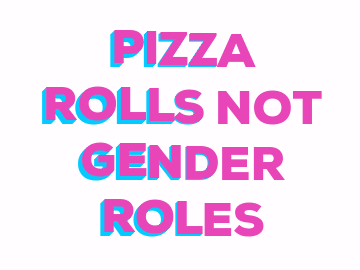
3 notes
·
View notes
Text
Fieldwork: Blast from the Past 🚀
When Did I Immigrate to the U.S.?🛫

I was born in Lagos, Nigeria, on October 8, 2003. And as far as I know, all my ancestors procreated there as well. I lived in Lagos for six years, giving me more than enough time to experience the atrocities of the Movement for the Emancipation of the Niger Delta (MEND) militant group on live television. Their cruelty, combined with rampant corruption in the government and education sector, spurred my parents to immigrate to the United States. They always strove to provide my sister and me with the best in life, but the conditions found in Nigeria were not ideal enough to permit their efforts. As a result, they left their well-paying government jobs, packed their bags, and—in 2009—embarked on a journey towards a promising country.
Where Are My Ancestors From? 🗺️

I feel as though my family history is a knot of uncertainty. My parents claim that we all hail from Nigeria, but seeing as though my name has Egyptian origins—thanks Urban Dictionary—a sprout of skepticism has grown in my head. Perhaps there's some deep, dark family secret my parents are attempting to hide from me; perhaps there's nothing at all. Whatever the case, it seems to have strengthened their resolve to keep Nigerian culture alive and well in our household, specifically my dad's. He blasts Yoruba praise in the car, chastises us for eating "American" food, and shakes his head at our lack of Yoruba proficiency. My mom, on the other hand, tiptoes on both sides of the cultural spectrum. One day, she'll be making amala and ewedu for the family to eat with our hands; the next, she'll buy Five Guys and watch us chow down on our bacon cheeseburgers.
🌎 How Do My Parents Integrate Both Identities? 🌍

Pictured above is my late grandfather—he's the one sitting. I've never met him, never spoken of him, or ever known his story. He's always been a mystery to me, but somehow, he comes to mind whenever I think of my Nigerian identity. He was an influential government official, but more importantly, he was a die-hard advocate for preserving Nigerian culture. Today, it saddens me that his efforts may vanish with me. My parents try to make Nigerian culture an integral part of our household, but it's clear that they too struggle with maintaining their ethnic identity in the face of American society. They celebrate American holidays such as Thanksgiving and the 4th of July. They actively participate in American elections. They watch comedies on Netflix instead of their usual African movies on YouTube—my dad's recently gotten into Cedric the Entertainer. They prefer wearing typical American fashion—polos and Nikes for dad, Ashley Stewart clothing and wedges for mom—over traditional Nigerian attire. They've even started inserting bits and pieces of slang into their English vernacular. But even with the firm hold American culture has over them, they try their hardest to maintain our ethnic culture at home. I have to commend them for their efforts. Seeing them struggle to sustain Nigerian culture in our home instills a sense of pride in me. Even with the overwhelming presence American culture has in our daily lives, they manage to keep the flame of our ethnic culture burning. If they can do that, who's to say I can't do the same?
0 notes
Text
Fieldwork: Don’t be non-racist; be anti-racist.
1.) Hypodescent ➜ the “one drop of blood” rule; racially mixed children are assigned the race of the subordinate parent
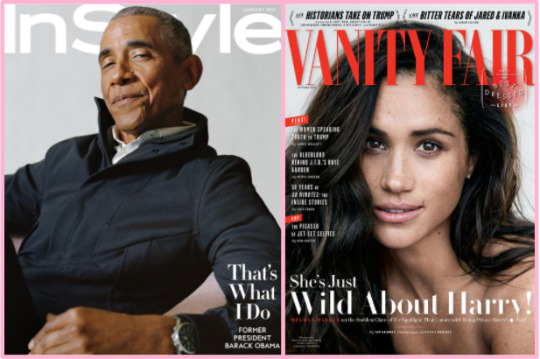
Barack Obama and Meghan Markle are both biracial—Obama has a white mother and black father while Markle has the opposite. Another thing they have in common: both have experienced discrimination based on their outward phenotype. Though they are both mixed with black and white, Obama has been called the n-word on numerous occasions; Markle has been questioned over how "brown" her child may be. Rather than being identified as equal members of both parent groups, biracials are seen for their minority parent group instead. In an article by the Harvard Gazette, it was discovered that "black-white biracials had to be 68% white before they were perceived as white." Even today, hypodescent remains unconsciously ingrained in our perception of people. Anyone who does not perfectly fit the "white" category is subjected to other classifications, regardless of their racial background.
2.) Microaggressions ➜ common verbal/behavioral snubs that communicate derogatory and negative messages toward minority groups

Microaggressions range far and wide. They operate against all minority groups in similar fashions. Any slight, snub, or insult meant to communicate hostile, derogatory messages about race, gender, sexual orientation, or religion fall under microaggressions. According to the Harvard Business Review, though comments of that nature are often said "inadvertently," they stem from centuries of learned biases associated with race, gender, sexuality, or religion.
3.) Cultural Appropriation ➜ the adoption of some specific elements of a minority culture by a different, mainstream cultural group

It's spooky season, and you know what that means: it's almost Culturally Insensitive Halloween! All jokes aside, cultural appropriation and cultural appreciation share two sides of the same coin. According to George Lipsitz, appropriation occurs when "an element of culture is adopted from a marginalized group without respect for its cultural meaning or significance or with the purpose of exploiting the culture for economic or social gain." Cultural appropriation is common among many celebrities, namely Katy Perry and the Kardashian family. Without sensitivity to what cultural symbols—clothing, headdresses, hairstyles—represent, the fine line between appropriation and appreciation is crossed and never ends well for the offender.
4.) Color Blindness ➜ a racial ideology that suggests that the best way to end discrimination is to treat individuals equally without consideration of race
https://www.youtube.com/watch?v=H4LpT9TF_ew

Color blindness—in regards to race—refers to the elimination of race as a consideration in a wide range of institutional processes. As good as that sounds, turning a blind eye to color equates to ignoring the uneven playing field created by centuries of legal racism and segregation. It clouds the historical effects of racism, the enduring legacy of discrimination, and the ingrained patterns of institutional behavior that bolster racism today. Claiming to be oblivious to color does not erase the unconscious racial biases people extend towards those of color, nor does it remove the impacts of institutional racism in our society.
5.) Institutional Racism ➜ patterns by which racial inequality is structured through key cultural institutions, policies, and systems
https://www.youtube.com/watch?v=QNJL6nfu__Q

Institutional racism involves racial inequality in education, health, housing, the legal system, law enforcement, etc. It originated from historical events and legal sanctions but persisted due to patterns of institutional behavior. Then, institutional racism was organized to privilege whites through slavery, Jim Crow laws, and immigration restrictions. Now, it is sustained through differences in employment rates, income and wealth, access to health care, and criminal sentencing patterns & incarceration rates. In Michael Jackson's song, his statement, "They don't really care about us," speaks volumes to the enduring racial disparities established in our society.
6.) Meritocracy ➜ a system that views people as a product of their own efforts AND in which equal opportunity is available to all

Meritocracy is a system upheld by the United States. It is a racial ideology that makes it difficult for people to acknowledge the existence of white privilege and lingering racism. In theory, a meritocracy provides equal access to social mobility, regardless of race, class, gender, or sexuality. All that is required is hard work, intelligence, and creativity. Sadly, due to the deep roots racism still holds in this society, meritocracy is not possible. Success in this day and age often hinges on the unrecognized and unearned advantages that have accrued over centuries of discrimination and unequal access based on race.
4 notes
·
View notes
Text
FIELDWORK: Relationship Between Gender & Language
Q: “Who run the world classroom?”
A: “Girls ♀️”

In my orientation class on Tuesday, we somehow managed to hold a lengthy conversation on something we all need help with: sticking to our goals. Actually, let’s be more specific; 10/29 people managed to hold a conversation on goals. What were the other 19 doing? Most were listening to the discussion; a good handful was on their phones; some were staring into space; one actually fell asleep. Poor soul.
Who Did More: For a relatively balanced class size, women far outnumbered men in terms of how often they spoke and how long their answers were. When the professor asked straightforward questions, more males elected to answer. When those questions turned into a discussion about our future goals, no males raised their hands. The conversation was instead dominated by females.
Speaking Time (Females): Since more females participated in the discussion, their average speaking time was much higher. They went into detail concerning the short and long-term goals they wanted to accomplish. They used various hand gestures and gazed around the lecture hall when speaking. The females did use a lot of filler words—like, basically, you know, and umm were used frequently—but they still managed to get their point across the room. They seemed very passionate about the goals they had set for themselves based on the clarity of their voices and their outward confidence.
Speaking Time (Males): Since more males participated in the quick-fire question portion of the class, their average speaking time was low. The professor asked simple questions such as, "What is the definition of a goal?" and "Why should we have goals?" Due to the simplistic nature of those questions, the males responded in a similar manner. Their answers were short and sweet; they lacked substance. The males also managed to use filler words—namely like and uhh—even though they spoke for considerably less time. They didn’t use many hand gestures besides the occasional head scratch and nod. When speaking, they didn’t look around the room like the females; instead, they kept their eyes locked on the professor from start to finish.
Influence of Professor: My professor is a female. Though she's not high-energy, she doesn't bore us to death. She keeps us engaged in the conversation by asking questions and taking the time to see if we have questions instead. She walks around the front of the room frequently and cracks jokes at times. Though I don’t think her gender affects the way she interacts with the class, I do think that it has a sizable influence on which sex participates more often. Her gender might make the females in the classroom feel more comfortable, thus, making them more willing to speak publicly. The opposite may be true for males. They might be more engaged in the conversation if they have a teacher of the same sex.
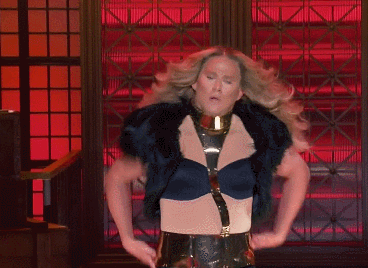
6 notes
·
View notes
Text
Bring👏🏾Back👏🏾Destiny’s👏🏾Child👏🏾
youtube
GENDER: When listening to the lyrics, it’s clear how gender is a heavy component of this song. Two key lyrics that reflects gender roles are as follows: “You thought I’d be weak without you, but I’m stronger. You thought I would be broke without you, but I’m richer.” Some people are stuck in the mindset that without a man in their lives, they’re unable to do anything. They can’t be successful, they can’t be fierce, and they can’t be independent. Through this song, Destiny’s Child shatters those gender roles, proving that they can excel to an even greater extent without a man. That’s what’s up!
POWER: Power and gender roles go hand in hand. In the song, they reclaim their power by stating that they’re going to “bring more success, no stress, and lots of happiness” without a man. Period.
DIALECT: In the song, they use words such as “gon’, diss, and chillin’.” Though it’s possible to hear other groups of people say those kinds of words, it’s typically attributed to African-American vernacular.
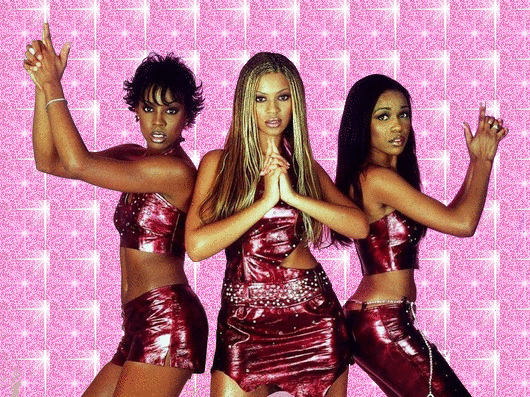
2 notes
·
View notes
Text
Making the Familiar Unfamiliar: The Campus Quad
"Sometimes it is the quiet observer who sees the most.” - Kathryn L. Nelson
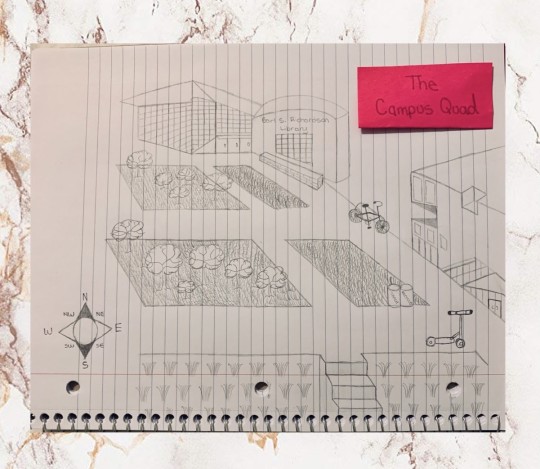
LOCATION: This map details the campus quadrangle located between Earl S. Richardson Library and Calvin & Tina Tyler Hall. I was drawn to this location because it’s one I frequent daily. I run out of breath often as I make my way from the third floor of the library to the side of Tyler Hall to quickly catch my cab. This time, instead of walking past the hustle and bustle of the quad, I sat down on a bench and observed the commotion around me.
OBSERVATION: It’s incredible how much we can see when we stop focusing on ourselves and really take a look at the world around us. As I sat down and shifted the focus off myself, I noticed things that were never apparent to me previously. There are lots of skaters, scooterists (I hope that’s a word), and bicyclists around here. I wondered how I never realized that before. They also like to race *a lot.* I didn’t expect to find amusement in sitting in one place for an hour, but those wannabe-NASCAR drivers and BMX racers proved me wrong. Pretty soon, a familiar but unexpected smell hit me dead in the face. My face scrunched up as I tried to inhale as little as possible. I got up and moved to a different area, but not before looking back to find the source of that horrid smell. There they were! I fixed my eyes on a small group of boys smoking—you guessed it—weed! I remember chuckling to myself as I walked away, dumbfounded that they would smoke on campus. I soon made my way home and reveled in the new observations I made earlier that day.
ANY ABSENCES?: In my head, I imagined that the quad would be bustling with social gatherings and events. To my surprise, that wasn’t the case. Sure, students hanging around, playing music, and talking amongst themselves, but it wasn’t to the extent I assumed it would. I had a schema of what I thought college night-life would consist of, but it was a complete 180° comparing what I believed to what was reality.
COVID-19 IMPACT: The quad has definitely been impacted by the virus. Even though some people elect to take their masks off and socialize freely, a good handful of people still follow the CDC guidelines. Even though it’s a good thing that a good percentage of people on campus choose to properly protect themselves from COVID, I feel as though that has some negative consequences when it comes to socializing with others. If the virus wasn’t around, I feel as though the quad would be a lot more packed than it already is.
4 notes
·
View notes
Text
Fieldwork: The Culture of Consumerism














Most Needed Item. Yes, I care too much about my face! Acne be gone!

After looking through all the items I have in my room and kitchen, I have to say I’m shocked at the number of things that came from Amazon, Walmart, Target, or Costco. I learned that I am definitely not immune to consumer culture. I always considered myself a frugal spender, but seeing the amount of money I’ve spent on clothes makes me cringe. Don’t get me wrong, I love all my jeans and jackets & my facial products; it’s just disappointing knowing that I’ve been sucked into this consumer lifestyle. I’ve spent money on shirts I’ll never wear, jackets that’ll never come out the closet, and jeans that’ll never see the light of day. All those purchases were made on a whim, regretted the next day, and then made again. It’s like a never-ending cycle, one that I’ll try hard to break out of. But maybe not today. There are a couple of jackets I’ve had my eye on recently...
2 notes
·
View notes
Text
FIELDWORK: Making UGGs Unfamiliar

** There is a difference between UGG®, Ugg Australia®, and UGG Since 1974™ **
1. History: The brand UGG® was discovered in 1978 by Australian-born Brian Smith. He created his first line of boots from sheepskin, his favorite material. Eventually, in 1995, Deckers Brands bought UGG® from Smith & made the company one of its many subsidiaries. They gained tremendous popularity in the early 2000s, with celebrities such as Oprah, Leonardo DiCaprio, & Jennifer Lopez spotted donning the classic boots. Sadly, due to the use of sheepskin, organizations such as People for the Ethical Treatment of Animals (PETA) and the Princeton Animal Welfare Society (PAWS) publicly rescinded their support for the brand. Even with this stain on their brand, UGGs continue to be a fall-fashion staple.
2. Manufactured In: There is a common misconception that all UGG® boots are manufactured in Australia. In actuality, all UGG® boots are made in Asian countries—such as China and Vietnam—the Dominican Republic, and the United States.
3. Impact: UGGs have a significant impact on my life, specifically during the fall. As the days become shorter and the air turns colder, I need to ensure I’m as snug as a bug in a rug; my UGG® boots help me accomplish that. The sheepskin lining guarantees that my feet are kept warm and cozy, even in sub-degree temperatures. With these boots, I never have to choose between style and function. They satisfy all my requirements.
4. People Involved: People from Asian countries such as China, Vietnam, & the Philippines are directly involved in the manufacture of UGG® boots. On average, Chinese factory workers make 47,901 Chinese Yuan ( ≈ $7,500) per year. Yes, per year. It takes 54,000 CNY ( ≈ $8,400) to barely scrape by in China—and that’s excluding health insurance, entertainment, and unforeseen circumstances. Regarding their lifestyle, I would say that if they’re single, they’re barely surviving. With such a low yearly income, there’s no room to splurge on clothes, eat out, look for entertainment, save up for university, or regularly visit the doctor. All that money goes towards the basic necessities.

**To clear any confusion, the above UGGs photo with the pink background was taken by me and edited using PixleCut**
11 notes
·
View notes
Text
5 Points of Globalization

Time-Space Compression: Someone from Sydney, Australia can easily text their best friend from Washington, D.C.

Flexible Accumulation: As people buy from Amazon more often, the company accumulates more and more money. Sadly, they don’t trickle that money back into the economy. Oftentimes, they go offshores in search of cheaper labor & lower taxes.

Increasing Migration: It’s now faster and easier to move from one place to another due to the improvement of transportation. We no longer get around by horse and carriage; now, we can move through trains, cars, & U-Hauls.

Adapting to & Changing the Natural World: Sadly, even though we change our world in positive ways, we change it in negative ways as well. Biohazardous waste make their way into the oceans & destroy those communities.

Uneven Development: There is an unequal distribution of the benefits of globalization. Here, the richer members of society live in high-rises, while the poorer members live in cramped & underdeveloped homes.
2 notes
·
View notes